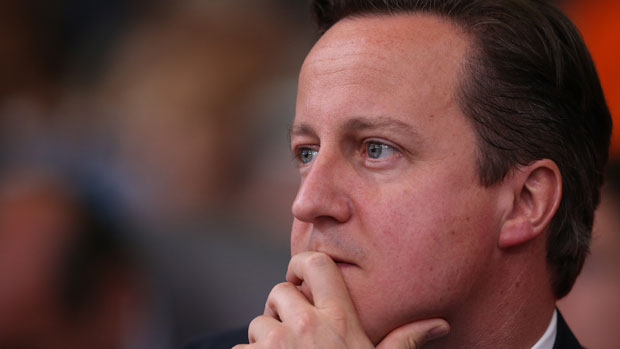Will David Cameron address the Israeli-Palestinian conflict?
After four-year delay, observers wonder if Middle East peace process is now finally a priority for PM

A free daily email with the biggest news stories of the day – and the best features from TheWeek.com
You are now subscribed
Your newsletter sign-up was successful
DAVID CAMERON found himself caught up in the sensitivities of the Israeli-Palestinian conflict before he even landed in Israel today for his first visit as Prime Minister.
The British leader is expected to promote bilateral trade, champion Holocaust education and discuss concerns over Iran's nuclear weapons programme during his trip. However, he is being watched closely to see whether or not he will recognise the country as a Jewish state.
Negotiating the Israeli-Palestinian issue is always a challenge for visiting British politicians, says Ben Lynfield in The Independent, and it appears Cameron has managed to leave Palestinians feeling that they are an "afterthought" before he even arrived.
The Week
Escape your echo chamber. Get the facts behind the news, plus analysis from multiple perspectives.

Sign up for The Week's Free Newsletters
From our morning news briefing to a weekly Good News Newsletter, get the best of The Week delivered directly to your inbox.
From our morning news briefing to a weekly Good News Newsletter, get the best of The Week delivered directly to your inbox.
Critics are apparently unhappy that he will spend just three hours of his two-day visit in Palestinian territory, with a spokeswoman for the Palestine Liberation Organisation accusing him of showing an "imbalance in the whole situation".
The reception for Cameron and his entourage may also be a little "rough around the edges", says Harriet Sherwood in The Guardian. It coincides with a long-running labour dispute in Israel's foreign ministry, as well as growing pressure from international leaders for a peace deal between Israel and the Palestinians.
Cameron is expected to restate the UK's position, endorsing the peace initiative of the US secretary of state, John Kerry, and warning that time is running out to implement the internationally backed two-state solution to the decades-long conflict.
But his tone is likely to be "notably friendly, rather than hectoring, towards Israel", says Sherwood.
A free daily email with the biggest news stories of the day – and the best features from TheWeek.com
Despite some robust statements from the UK Foreign Office, Cameron has not previously embraced the Israeli-Palestinian issue, she says.
As one Israeli government official tells the Guardian: "Israel does not seem a priority for him. Perhaps, rather like Obama's desire to be the 'un-Bush', Cameron is doing the 'un-Blair' thing. Relations have been a little bit cooler. So now we'd like to see a gesture of friendship."
The BBC says Cameron is likely to "stick to Britain's usual lines", acknowledging Israel's security concerns but criticising settlement building in the occupied West Bank and East Jerusalem.
Nevertheless some would like to see him go further and support a boycott of settlement produce. Currently, the UK Government opposes a boycott but supports clear labelling of settlement produce to allow consumers to make an informed choice.
Quite why it has taken Cameron four years to visit Israel is "the subject of mild curiosity both here and in Tel Aviv", says Benedict Brogan in the Daily Telegraph. "It's fairest to say that, relative to some of his predecessors, the Middle East peace process has not grabbed him as an issue."
Cameron has left it late, adds Brogan, but not too late, and his speech to the Israeli parliament will be "followed closely" to see if he follows in the footsteps of Germany, the US and Canada in recognising Israel as the home of the Jewish people.
-
 The ‘ravenous’ demand for Cornish minerals
The ‘ravenous’ demand for Cornish mineralsUnder the Radar Growing need for critical minerals to power tech has intensified ‘appetite’ for lithium, which could be a ‘huge boon’ for local economy
-
 Why are election experts taking Trump’s midterm threats seriously?
Why are election experts taking Trump’s midterm threats seriously?IN THE SPOTLIGHT As the president muses about polling place deployments and a centralized electoral system aimed at one-party control, lawmakers are taking this administration at its word
-
 ‘Restaurateurs have become millionaires’
‘Restaurateurs have become millionaires’Instant Opinion Opinion, comment and editorials of the day
-
 Epstein files topple law CEO, roil UK government
Epstein files topple law CEO, roil UK governmentSpeed Read Peter Mandelson, Britain’s former ambassador to the US, is caught up in the scandal
-
 Iran and US prepare to meet after skirmishes
Iran and US prepare to meet after skirmishesSpeed Read The incident comes amid heightened tensions in the Middle East
-
 Israel retrieves final hostage’s body from Gaza
Israel retrieves final hostage’s body from GazaSpeed Read The 24-year-old police officer was killed during the initial Hamas attack
-
 China’s Xi targets top general in growing purge
China’s Xi targets top general in growing purgeSpeed Read Zhang Youxia is being investigated over ‘grave violations’ of the law
-
 Panama and Canada are negotiating over a crucial copper mine
Panama and Canada are negotiating over a crucial copper mineIn the Spotlight Panama is set to make a final decision on the mine this summer
-
 Why Greenland’s natural resources are nearly impossible to mine
Why Greenland’s natural resources are nearly impossible to mineThe Explainer The country’s natural landscape makes the task extremely difficult
-
 Iran cuts internet as protests escalate
Iran cuts internet as protests escalateSpeed Reada Government buildings across the country have been set on fire
-
 US nabs ‘shadow’ tanker claimed by Russia
US nabs ‘shadow’ tanker claimed by RussiaSpeed Read The ship was one of two vessels seized by the US military